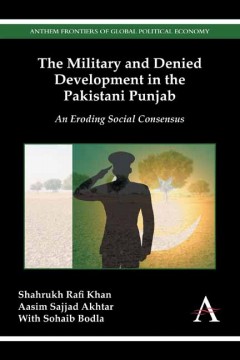The Military and Denied Development in the Pakistani Punjab
An Eroding Social Consensus
By Shahrukh Rafi Khan & Aasim Sajjad Akhtar
With Sohaib Bodla
Anthem Frontiers of Global Political Economy and Development
Other Formats Available:
E-Book- About This Book
- Reviews
- Author Information
- Series
- Table of Contents
- Links
- Podcasts
About This Book
Military power has long been a serious obstacle to a sustained democracy in Pakistan. The authors investigate the Pakistani military’s retrogressive agrarian interventions in the Punjab, and outlines a change, as recognised by society, in the military’s rightful function within the economy.
Set against the social resentment instigated by the military’s agricultural land grabbing, and a burgeoning resistance to the military’s overbearing and socially unjust role in Pakistan’s economy, this book supplements a larger body of work detailing the military’s hand in industrial, commercial, financial and real estate sectors. Any gain in economic autonomy wielded by the military makes it less answerable to civilian oversight, and makes it more likely to act to protect its economic interests.
The survival of civilian rule in Pakistan, which is critically important for the foreseeable future, requires a fundamental reordering of the balance of power between state institutions, and between state and society. Pakistan, long encumbered by the military yoke, has witnessed its first peaceful transition from one political administration to another; and in a move congenial to the consolidation of this democratic process, ‘The Military and Denied Development in the Pakistani Punjab’ exposes the nefarious nature of the military’s predation, and signals a move for the military to be contained to its constitutionally mandated role – defence.
Reviews
“This is a pioneering study of the military’s appropriation of land to enrich retired servicemen and, more importantly, strengthen its economic domination as a corporate entity.” —Tariq Rehman, Beaconhouse National University, Lahore
“This engaging, grounded book captures the essence of military influence and control throughout Pakistan’s economy and doesn’t shy away from exploring everyday acts of social resistance. Arguing that the military is in large part responsible for ‘development denied,’ this book is essential reading for anyone seeking to understand politics, economics and many of the reasons behind the social upheavals in Pakistan today.” —Anita M. Weiss, University of Oregon
“Analytically incisive, the authors boldly reveal how growing resistance to military authority in rural Punjab is eroding the army’s institutional power and challenging its sacrosanct status in Pakistan’s politics.” –Kavita Khory, Mount Holyoke College, South Hadley, Massachusetts
“This is a pioneering study of the military’s appropriation of land to enrich retired servicemen and, more importantly, strengthen its economic domination as a corporate entity.” —Tariq Rehman, Beaconhouse National University, Lahore
“This engaging, grounded book captures the essence of military influence and control throughout Pakistan’s economy and doesn’t shy away from exploring everyday acts of social resistance. Arguing that the military is in large part responsible for ‘development denied,’ this book is essential reading for anyone seeking to understand politics, economics and many of the reasons behind the social upheavals in Pakistan today.” —Anita M. Weiss, University of Oregon
“Analytically incisive, the authors boldly reveal how growing resistance to military authority in rural Punjab is eroding the army’s institutional power and challenging its sacrosanct status in Pakistan’s politics.” –Kavita Khory, Mount Holyoke College, South Hadley, Massachusetts
Author Information
Shahrukh Rafi Khan is a Visiting Professor of economics at Mount Holyoke College, South Hadley, Massachusetts.
Aasim Sajjad Akhtar is Assistant Professor of political economy at the National Institute of Pakistan Studies, Quaid-i-Azam University, Islamabad, Pakistan.
Sohaib Bodla is currently working as a freelance writer and researcher, and as a volunteer for NGOs including the Dutch development organization, Cordaid.
Series
Anthem Frontiers of Global Political Economy and Development
Table of Contents
Preface; 1. The Military and Economic Development; 2. Punjab’s State–Society Consensus on the Military’s Dominance and Economic Role; 3. Research Design, Method, Institutional Issues and Scope of the Military’s Land Acquisitions; 4. The Military’s Agrarian Land Acquisitions: High Handedness and Social Resentment; 5. From Social Resentment to Social Resistance; 6. Bahria Town: A Military-Related Real Estate Venture; 7. The Military as Landlord in the Pakistani Punjab: Case Study of the Okara Farms; 8. Guardians No More? The Breakdown of the Consensus; Glossary; Index
Links
Stay Updated
Information
Latest Tweets



